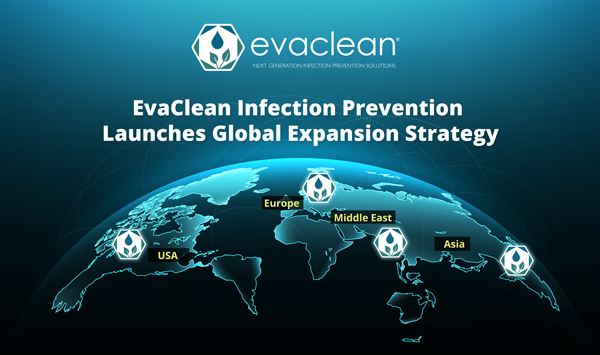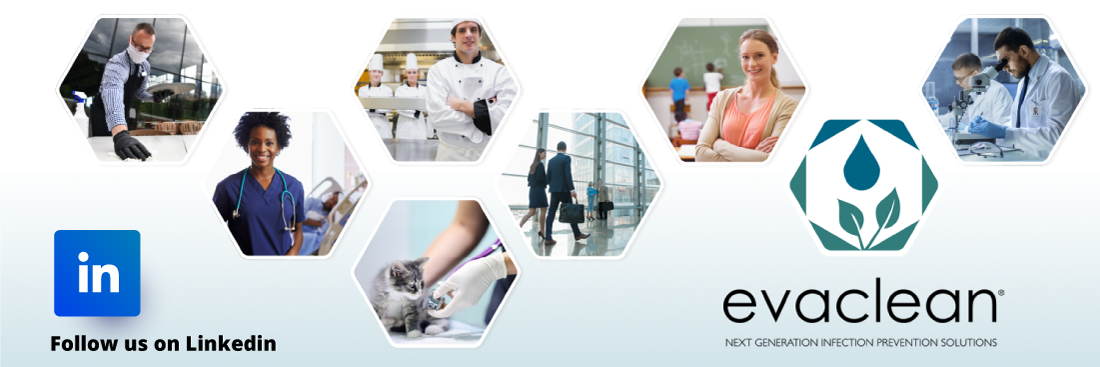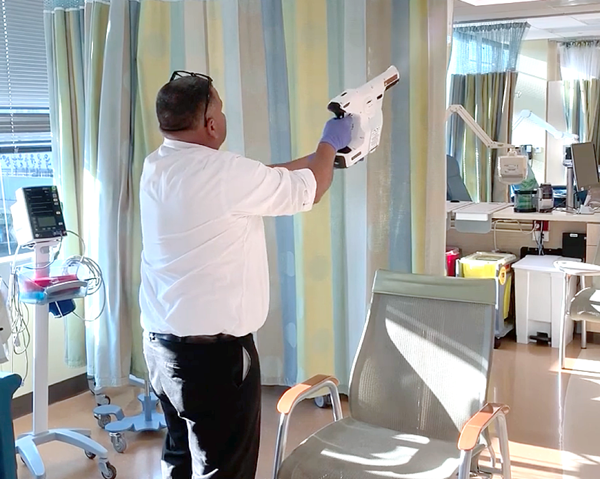News & Events
January 1, 2020 | Newsletter
Infection Control and Sanitation News to Use
Welcome to the January edition of EvaClean Insights. Your source for all things infection prevention.
Benchmarks of Broad-Spectrum Chemistries
The EvaClean Q&A Column is where interviews with industry thought leaders provide insights on important infection prevention issues. January includes Part 3 of the series with chemist and environmental microbiology scientist, Mark Hodgson, LRSC, CMIP of Kersia Medical, an authority on disinfectant chemistries who has been published extensively in infection prevention journals. In this article, you’ll learn what defines a truly broad-spectrum chemistry and why it can make all the difference to process improvement.
EC: What does “broad-spectrum chemistry” mean and why is it important?
MH: When it comes to disinfection, not all microorganisms are equal and some are harder to kill than others. Viruses, bacteria, and fungi each have unique characteristics that make them easier or harder for disinfectants to mitigate. Typically, gram-negative
bacteria are easier to inactivate than gram-positive, mycobacteria are harder to kill than gram-negative bacteria, and endospore-forming bacteria are the most resistant of all. Though broadly correct, this assessment does not address the subtle differences between chemical efficacies. For instance, some heavy catalase-producing bacteria have an inherent resistance to hydrogen peroxides. Generally speaking, the best way to judge a broad-spectrum disinfectant is by its breadth of efficacy against most of the pathogens found on fomites. Ideally, it should have EPA registered kill claims for at least one representative from each of the following microorganism groups:
- Large enveloped viruses
- Gram-negative bacteria
- Filamentous fungi
- Gram-positive bacteria
- Small un-enveloped viruses
- Mycobacteria
- Endospore forming bacteria (in spore form)
One area often overlooked is how AOAC testing is based on bacteria dried on carrier slides and does not consider biofilms, which can seriously impact chemical efficacy. Biofilm bacteria continue to contaminate surfaces even after disinfection. Therefore, to be fully effective, a broad-spectrum disinfectant should have a kill claim against bacteria in biofilm. NaDCC is one of the few chemistries to have this claim. It is blended with surfactants that directly target biofilm bacteria and work well in the presence of soil loads.
Broad-spectrum chemistries should also be versatile enough to use as anything from cleaner and sanitizer to hospital-grade disinfectant, fungicidal, sporicidal, and tuberculocidal. It should also serve as a food contact and soft fabric sanitizer. However, this is only relevant to bacteria, not viruses.
Historically, most facilities use an average of seven to ten different chemicals for various cleaning and disinfection tasks, each with separate instructions, contact times, etc. Multi-purpose chemistries like NaDCC that work for virtually every application will dramatically simplify processes and eliminate failure points. It’s also capable of addressing the diverse needs of many different industries. Ultimately, standardizing processes around one truly broad-spectrum chemistry will provide maximum efficacy without sacrificing safety and will significantly improve outcomes for every type of facility. For more information on EvaClean’s disinfectants, visit https://evaclean.com/products

EvaClean Launches Global Expansion Strategy
EvaClean is rolling out a global expansion initiative to provide safer, more sustainable infection prevention solutions across Europe, Asia, the Middle East, and worldwide. Building on the U.S. success, EvaClean’s Founder and Chairman, RJ Valentine added a world-class executive team with the experience and capabilities to lead an expansion of international magnitude.
Valentine said, “Covid-19 significantly accelerated growth opportunities for this business. Guided by CEO Steve Wilson, COO Kurt Wong, CMO Dan Clifford, and Global VP of Sales Rich Prinz, EvaClean is prepared to help save lives worldwide by mitigating the multitude of infectious illnesses that already exist, as well as those yet to come.”
EvaClean has opened head offices in Singapore and Ireland and, together with strategic distribution partners, will serve Asia, the EU, the UAE, and Saudi Arabia.
“The combination of domestic business growth, a strong leadership team, and successful preliminary international tests gave us confidence it was time for worldwide expansion,” said CEO Steve Wilson. “The recent emergence of new variants further reinforces our commitment to service all corners of the globe.”
EvaClean also augmented customer success capabilities and expert field support teams in order to ensure a consistently high level of service in the U.S. and abroad.
Rich Prinz, Global VP of Sales said, “There is a tremendous need for a safer, simplified, and sustainable approach to infection control in some of the largest population centers on the planet. Proactive infection prevention is a global imperative.”
No matter where you are in the world, reach out to us about our safer, more sustainable infection prevention solution here.

Stay in the know on LinkedIn
Our LinkedIn page is your link to the latest updates and guidance on best practices for cleaning and disinfection. Our followers are the first to learn about trending topics, timely industry news, and special announcements. You can follow us here!
